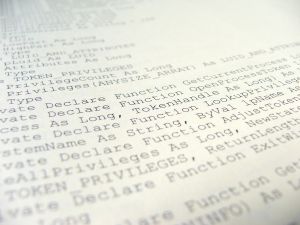
"People naively say to me, "If your program is innovative, then won't you get the patent?" This question assumes that one product goes with one patent." —Richard Stallman

THE USPTO is a sordid mess. As the previous article served to show, it attracts many opportunists and trolls. However, recent amendment of guidelines used inside the USPTO examination pipeline stopped many software patents, rendering them invalid while citing Alice (a relatively recent SCOTUS ruling). Both the court system and the patent system are now far less favourable or tolerant towards software patents.
"These patents are affecting not only Free software but also proprietary software."As usual, patent lawyers' sites are quick to shoot down the message and the messengers. Legal News Line says that a "new study shows first decline in patent litigation in five years". It of course proceeds to refutation attempts. Other lawyers (McDonnell Boehnen Hulbert & Berghoff LLP in this case) are trying hard to shoot down claims that software patents are being stopped in the US. Here is their abstract: "A recent publication by PricewaterhouseCoopers announced that patent suit filings in 2014 had reduced by 13% from the prior year, and concluded that this "dramatic shift" was "[d]riven by Alice Corp. v. CLS Bank, which raised the bar for patentability and enforcement of software patents" (see "2015 Patent Litigation Study: A change in patentee fortunes"). This rather strong attribution has in turn driven a number of news outlets, such as IPLaw 360 and bloggers to pick up the story (see "Patent Lawsuits Took First Dive In Years, Report Says" and "Patent Litigation Study Should Cause Patent Reform Pause")."
They say that this report "raises questions", but actually it answers a question and tackles an issue. It's a step towards the solution.
Another patent lawyers' site, Managing IP, says that "Rumours of the death of software patents are greatly exaggerated" (well, they sure would hope so) and Gene Quinn (very vocal proponent of software patents, for he is a patent lawyer) asks, "Is there a future for software patents in an age of software innovation?"
What we are hoping to show here, as we did many times before, is that patent lawyers are very concerned about the death of many patents on software, not only at the court level but also, increasingly, at the examination level (where they can make a lot of money at the expense of software developers). These patents are affecting not only Free software but also proprietary software. Even Bitcoin, which strives to reform today's monetary system, is said to be affected. As this report from the beginning of the month put it: "Bitcoin wallet company BitGo, Inc. is currently being circled by Redditors for its alleged attempts to patent the Bitcoin multisig technology.
"The San Francisco based company had submitted a patent request to the United States Patent and Trademark Office (USPTO) on February 4th last year, a document of which was published yesterday, on April 30th 2015. The document reveals BitGo’s application in which it is seeking a patent for a network device that is “configured to receive public keys, over an electronic network, of two or more second public-private keys,” something that is reportedly identical to the multisig functionality."
They are patenting cryptological methods now. This is like patenting mathematics. It has got to stop at the examination level, not just at the courts (legal fees are obscenely high). ⬆